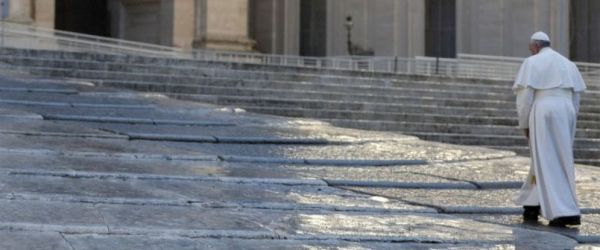In today’s Gospel, there is a question posed three times: “What shall we do?” (Lk 3:10, 12, 14). It is raised to John the Baptist by three categories of people: First, the crowd in general; second, the publicans or tax collectors; and, third, some soldiers. Each of these groups questions the prophet on what must be done to implement the conversion that he is preaching. John’s reply to the question of the crowd is sharing essential goods. He told the first group, the crowd, to share basic necessities, and therefore says: “He who has two coats, let him share with him who has none; and he who has food, let him do likewise” (v. 11). Then, he tells the second group, the tax collectors, to collect no more than the amount owed. What does this mean? No taking ‘bribes’, John the Baptist is clear. And he tells the third group, the soldiers, not to extort anything from anyone and to be content with their wages (cf. v. 14). There are three answers to the three questions of these groups. Three answers for an identical path of repentance, which is manifested in concrete commitments to justice and solidarity. It is the path that Jesus points to in all his preaching: the path of diligent love for neighbour.
From John the Baptist’s admonitions, we understand the general tendencies of those who at that time held power, in various forms. Things have not changed very much. However, no category of people is excluded from following the path of repentance to obtain salvation, not even the tax collectors, considered sinners by definition: not even they are excluded from salvation. God does not preclude anyone from the opportunity to be saved. He is — so to speak — anxious to show mercy, to show it towards everyone, and to welcome each one into the tender embrace of reconciliation and forgiveness.
We feel that this question — “What shall we do?” — is ours also. Today’s liturgy tells us, in the words of John, that it is necessary to repent, to change direction and take the path of justice, solidarity, sobriety: these are the essential values of a fully human and genuinely Christian life. Repent! It sums up the message of the Baptist. And the Liturgy of this Third Sunday of Advent helps us to rediscover a special dimension of repentance: joy. Whoever repents and approaches the Lord, feels joy. The prophet Zephaniah says to us today: “Sing aloud, O daughter of Zion!”, addressing Jerusalem (Zeph 3:14); and the apostle Paul exhorts the Christians of Philippi: “Rejoice in the Lord always” (Phil 4:4). Today, it takes courage to speak of joy, which, above all, requires faith! The world is beset by many problems, the future is burdened by uncertainties and fears. Yet, Christians are a joyful people, and their joy is not something superficial and ephemeral, but deep and stable, because it is a gift from the Lord that fills life. Our joy comes from the certainty that “the Lord is at hand” (Phil 4:5): he is close with his tenderness, his mercy, his forgiveness and his love.
May the Virgin Mary help us to strengthen our faith, so that we are able to welcome the God of joy, the God of mercy, who always wants to live in the midst of his children. May our Mother teach us to share tears with those who weep, in order to be able to also share a smile.
[Pope Francis, Angelus 13 December 2015]












